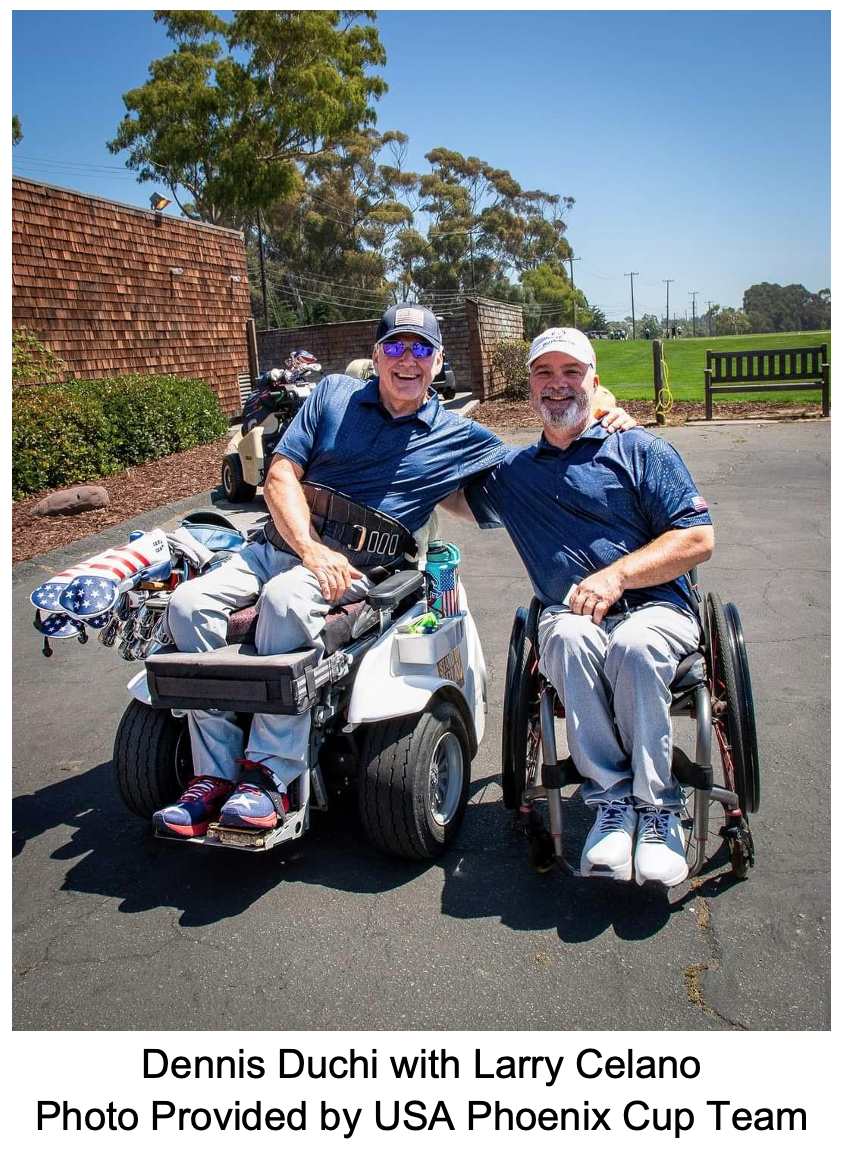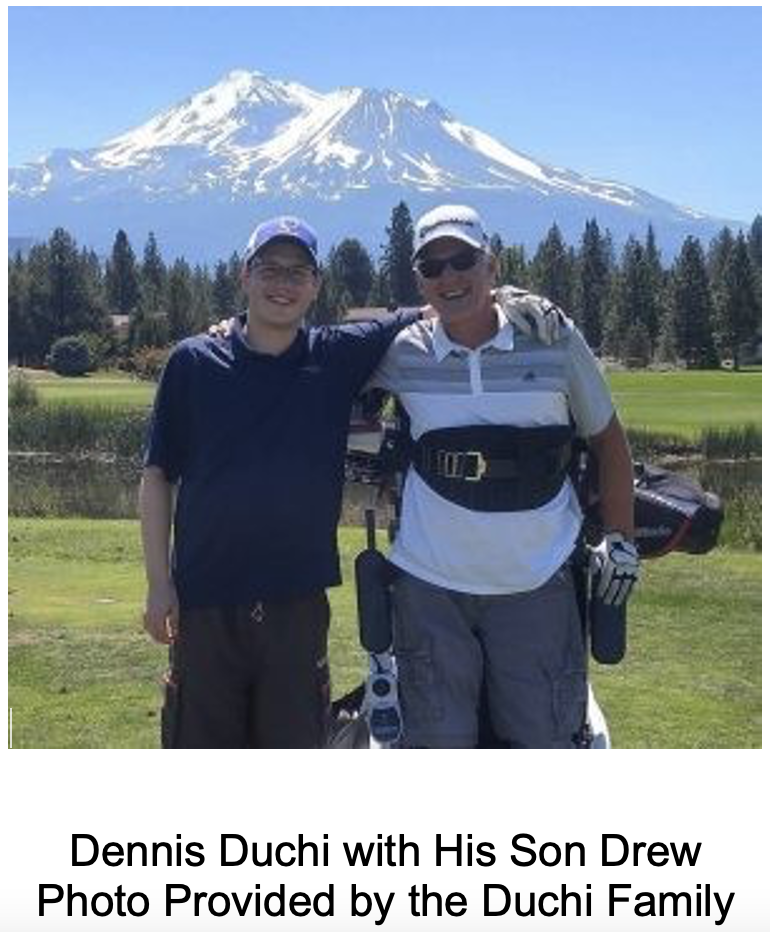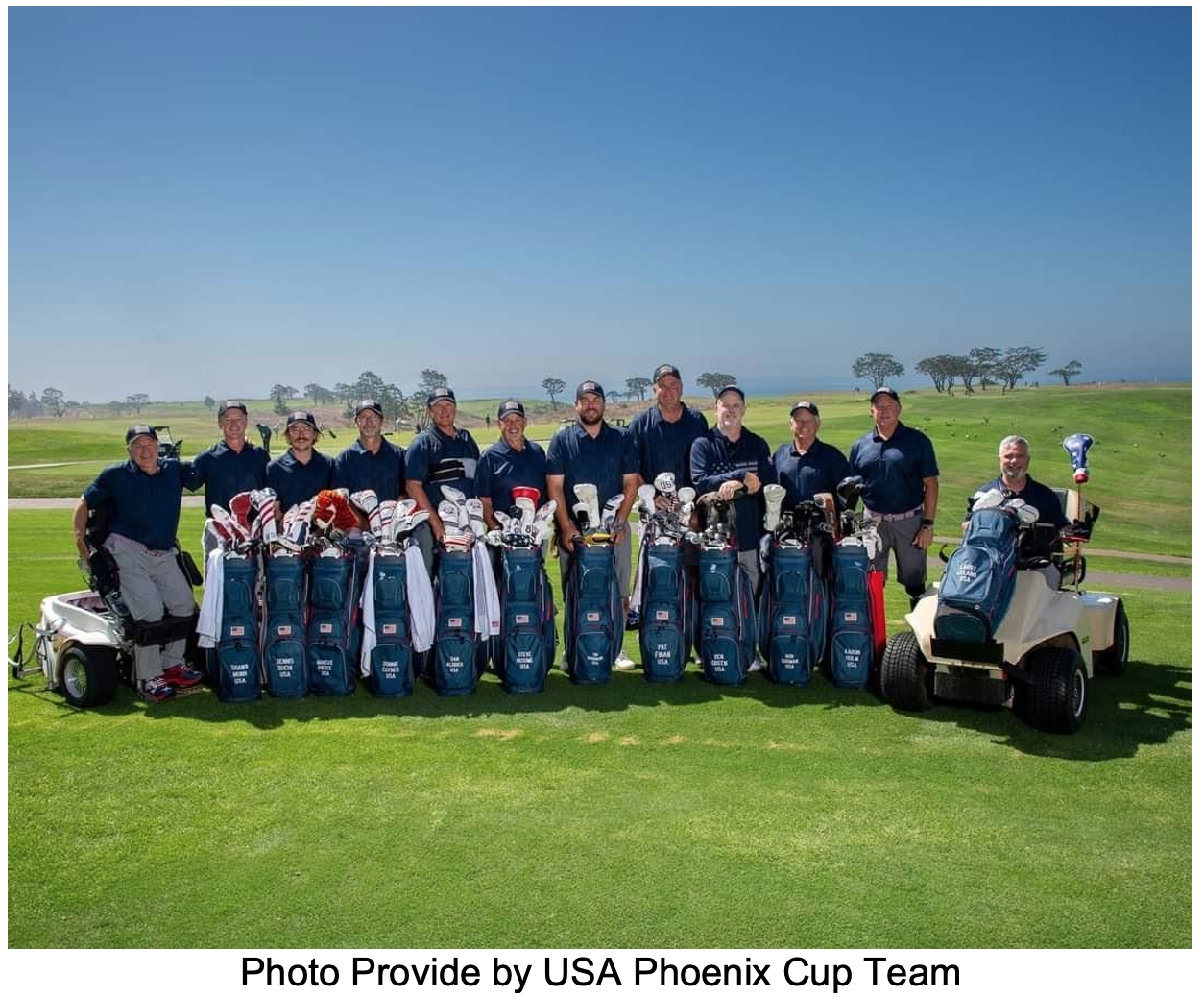In Memoriam - Dennis Duchi - September 5, 2023
Living Every Day to the Fullest
By Rich O'Brien
 From an early age, Dennis Duchi loved to be on the golf course and would regularly play 54 holes a day as a kid. A good athlete in numerous sports, as a teenager Dennis became a low single digit handicap golfer thanks largely to his ability to drive the ball over 300 yards. His passion for golf continued into his twenties and thirties while balancing work and family obligations.
From an early age, Dennis Duchi loved to be on the golf course and would regularly play 54 holes a day as a kid. A good athlete in numerous sports, as a teenager Dennis became a low single digit handicap golfer thanks largely to his ability to drive the ball over 300 yards. His passion for golf continued into his twenties and thirties while balancing work and family obligations.
Then one fateful day in January of 2004, Dennis was at a fundraiser for his son's junior ski team. An avid skier, Dennis attempted a seemingly innocuous jump that went horribly wrong, and it all came crashing down on his head. The crash landing resulted in the rupture of his T12 vertebrae which crushed his spine and resulted in paralysis.
Dennis didn’t know the challenges that he would face in the coming weeks, months, and years ahead, but he faced each new challenge with an infectious positive attitude. He added, “I’d always been pretty resilient and always bounced back from accidents and figured, I’ll just put everything into it.” One of the challenges that he didn’t see coming was the overwhelming emotional strain experienced by his family that resulted in a divorce and a fractured relationship with his son.
Having been an avid golfer for over three decades, Dennis truly missed being able to golf and the social elements that makes the game so special for tens of millions of golfers worldwide. He longed for the opportunity to play golf again but after his spinal cord injury he thought it would only be an unrealized dream.
That was until August of 2014, when he learned about the Paragolfer. A few days later, he was on his way from his home in Weed, CA to San Diego to meet with Anthony Netto who was a golf professional who suffered a spinal cord injury that took him away from the game for ten years before he helped co-designed the Paragolfer to get himself back into the game. It was that day Dennis became the proud owner of a ParaGolfer. Being able to golf again was literally a dream come true for Dennis.
The next challenge that he faced was relearning how to play the game while only being able to swing with the upper body. When his comeback first began his handicap index was in the upper thirties but, with excellent coaching from Netto and a ton of hard work and dedication, Dennis gradually lowered his index down to 15 and began competing in adaptive golf events in the US and around the world.
Last year, he told me that he enjoyed the game more as a 15 handicap because it was a huge accomplishment to get there and, in the process, become one of the highest ranked international players in the seated division.
Dennis also told me that he sees the adaptive golf community as one big extended family saying “we all root for each other because we want to see everybody have success and fun. It doesn’t matter if you’re missing an arm, missing a leg, you don’t have hands... whatever. You look at the disabilities of all the players and it’s just so inspiring to see the fact that they’re out here playing.” He said he was ecstatic every time he got to play because he would meet great people from around the world. He added. “It is so much fun getting back out with the guys. The things we used to take for granted mean so much more now. For me, the game is more fun now.”
In addition to giving him a new lease on life, golf gave him a second chance to play with his father and his son. This helped him mend his once fractured relationship with his son Drew who became proud of him because he kept moving forward despite everything that he had been through.
 The Phoenix Cup
The Phoenix Cup
Dennis had the honor of being selected to represent the United States as one of the twelve members of this year’s Phoenix Cup Team. The Phoenix Cup is disabled golf’s equivalent of the Ryder Cup pitting Team USA versus Team Europe. The 29th playing of the event was held from August 28th-30th in Santa Barbara, California. Dennis was a positive force on the team with his infectious smile, quick wit, and positive attitude setting the tone for the team. He spent the week enjoying the heck out of life and the opportunity to represent his country in such an amazing international competition.
On the first day, Dennis was paired with Ken Green, a former Ryder Cup player for the United States who suffered an amputated right leg below the knee. On the second day, Dennis and his playing partner Steve Husome were first off and with their win led the charge to give Team USA a commanding 8-4 lead heading into the last day’s singles matches. On the final day, Team Europe rallied to make the matches close as the Phoenix Cup came down to the final hole of the final match before the USA team earned a halve in the match to clinch the victory 13 to 11. That afternoon, Team USA experienced the feeling of euphoria of winning one of the coolest events in adaptive golf. As they said their goodbyes, they said they looked forward to seeing each other at future adaptive golf tournaments.
Little did they know, it would be the last time they would see one of their teammates.

In the days that followed the Phoenix Cup, Drew Duchi said that his father was happier than he had ever seen him. Sadly, a few days after returning home after the Phoenix Cup victory, Dennis suffered a massive stroke and passed away on September 5th.
May that serve as a reminder for all of us to live every day to the fullest just as Dennis did despite his paralysis. Cherish every day as a gift from God for it may be our last. Rest in peace Dennis. You will be greatly missed!!
Tribute to Dennis by David’s Chair
**********************************
About the Author:
Rich O’Brien is a member of the Board of Directors for the National Alliance for Accessible Golf. Rich is a golf writer who tells the stories of golfers who use golf as therapy to recover from their injuries, illnesses, or challenges. Rich survived a complex polytrauma that included a broken back, a broken neck, four skull fractures, and brain damage in every lobe of his brain. Golf therapy was a big part of his own recovery. Now he is an advocate for individuals with disabilities.
